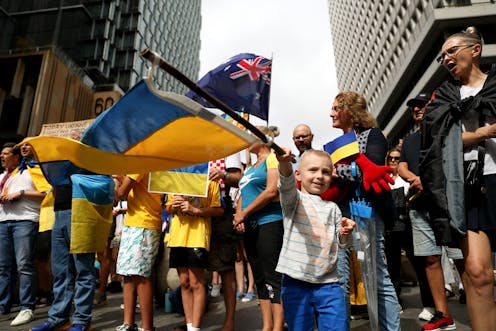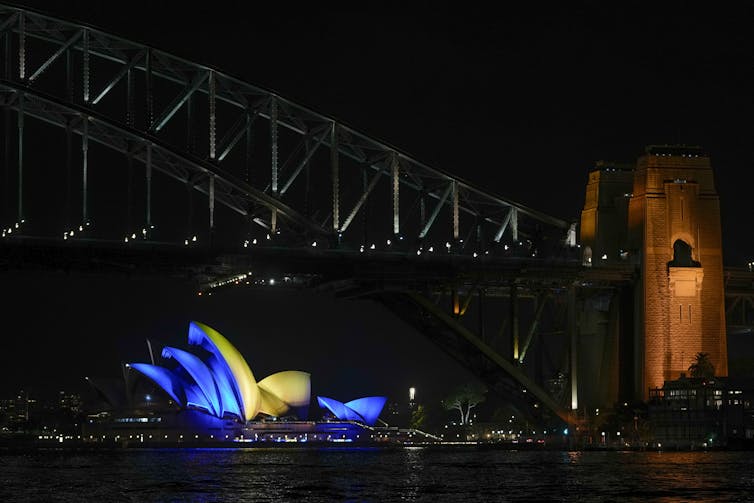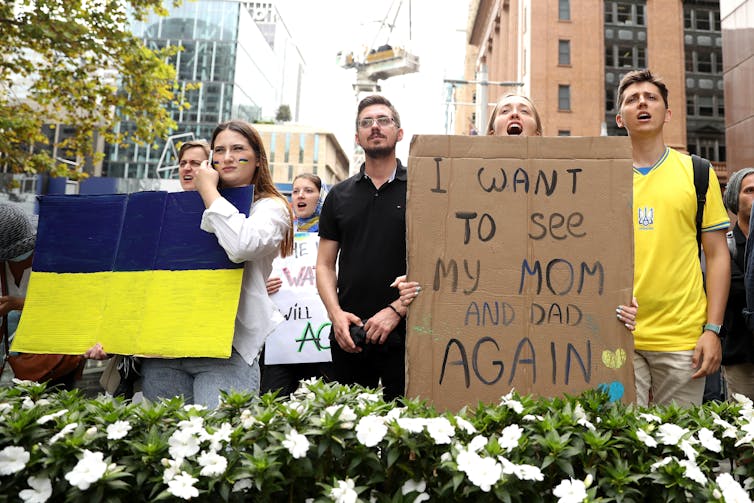Source: The Conversation (Au and NZ) – By Anastasiya Byesyedina, PhD Candidate in the Department of Government and International Relations, Sessional Teacher and Student Writing Fellow, University of Sydney

Brendon Thorne/AAP
Last Friday afternoon, I received a phone call from my mother in Ukraine. It was 5am Kyiv time and I heard her voice tremble as she told me, “Putin announced an invasion – I can hear bombing!”.
Ukrainians around the world are watching the Russian invasion of their home in horror and distress. As a researcher in Australia, my interests are in the study of Ukrainian revolutions and identity. But before all that, I am Ukrainian.
It is a surreal and gut-wrenching experience to hear the voice of your loved one in crisis when you are oceans apart. Feelings of fear, shock and angst run through every Ukrainian trying to grapple with the reality of war from afar.
So, sleep deprived but hopeful, Ukrainians in Australia are spending their days relentlessly attending rallies and waiting for phone calls from their family.
Ukrainians in Australia
Ukrainians have a long and significant history in Australia. Records show Ukrainians began migrating to Australia as early as 1860, but the largest wave of migration was in 1948 when Ukrainian refugees arrived from displaced persons camps in Europe after the second world war.

Mark Baker/AAP
Following Ukraine’s independence in 1991, younger Ukrainian professionals came to Australia on skilled visas.
According to the 2016 Census there were 13,366 Ukraine-born people in Australia. Victoria has the largest number at 5,322, followed by New South Wales (4,830), Queensland (1,248) and South Australia (929). More than 46,000 people reported they had Ukrainian ancestry.
Due to the complex history and geography of the region, some Russians in Australia will also have family in Ukraine or identify as Ukrainian.
Rallying and praying
The Ukrainian community in Australia is not just watching the war, they are trying to stop it with rallies.
Whether they are students, couples, families with children, old or young, Ukrainians in Australia have the same goals. They want to raise awareness of Russian atrocities on Ukrainian land and ensure the Australian government provides enough support in the form of military aid, humanitarian relief, migration aid and sanctions.
So, regardless of the weather, Ukrainians in Melbourne, Adelaide, and Sydney have marched.
You will have seen them wearing vyshyvankas – a blouse embroidered with patterns that differ depending on the region of Ukraine someone is from. Waving Ukrainian flags and singing the Ukrainian national anthem have also become a daily ritual. A key line is “Ukraine is not yet dead, nor its glory and freedom”, echoing past and present resilience against Russian aggression.
Community groups, such as the Australian Federation of Ukrainian Organisations, have also been working with the Ukrainian community, sending letters to local MPs and talking to Ukrainian families here and abroad.
Some Ukrainians have also been going to church. The Holy Transfiguration of Our Lord Parish in Sydney’s Blacktown is one of the oldest Ukrainian churches recorded in Australia and has been uniting the Ukrainian diaspora over the past week. As priest Vadym Koreniuk told me:
We are in dark times. Feeling that you are not alone is very reassuring. It helps to keep you sane.
It is encouraging to see Prime Minister Scott Morrison has already agreed to provide Ukraine with military and humanitarian aid. This needs to continue.
Australia – and the rest of the world – must maintain the pressure against Russia. Boycotting Russian products may be another way to do this.
Support from other former Soviet states
Since the invasion of Ukraine, we have also been encouraged by the solidarity among other diaspora communities here in Australia. The rallies have seen Australians, Georgians, Poles, Lithuanians and Russians – to name a few – come out to support the Ukrainian people.

Brendon Thorne/AAP
This is reminiscent of protests in Ukraine in 2013 and 2014, against Russian-backed former president Victor Yanukovych. These were also supported around the world, most notably by neighbouring citizens.
The significance of ethnic groups who were once part of the Soviet empire joining Ukrainian rallies here cannot be overstated. These groups are more than familiar with the repercussions of Soviet and Russian aggression. During Sydney’s Martin Place rally on Saturday, I heard a Russian man say:
I was born Russian, it was not my choice […] But why I am now standing with this flag, the flag of an aggressor, the flag of a colonial empire?
He then burned his Russian passport.
The diaspora’s vital role
The rallies are set to continue. It is vital for the Ukrainian community in Australia to be continuously heard. As a diaspora group, this is the least we can do for our family, friends and Ukrainian National Army back home.
In the meantime, I try to talk to my mother every day, hoping this nightmare ends and that I can see her face again.
![]()
Anastasiya Byesyedina does not work for, consult, own shares in or receive funding from any company or organisation that would benefit from this article, and has disclosed no relevant affiliations beyond their academic appointment.
– ref. ‘We are in dark times’: what is it like for Ukrainians in Australia watching their country at war? – https://theconversation.com/we-are-in-dark-times-what-is-it-like-for-ukrainians-in-australia-watching-their-country-at-war-178029




